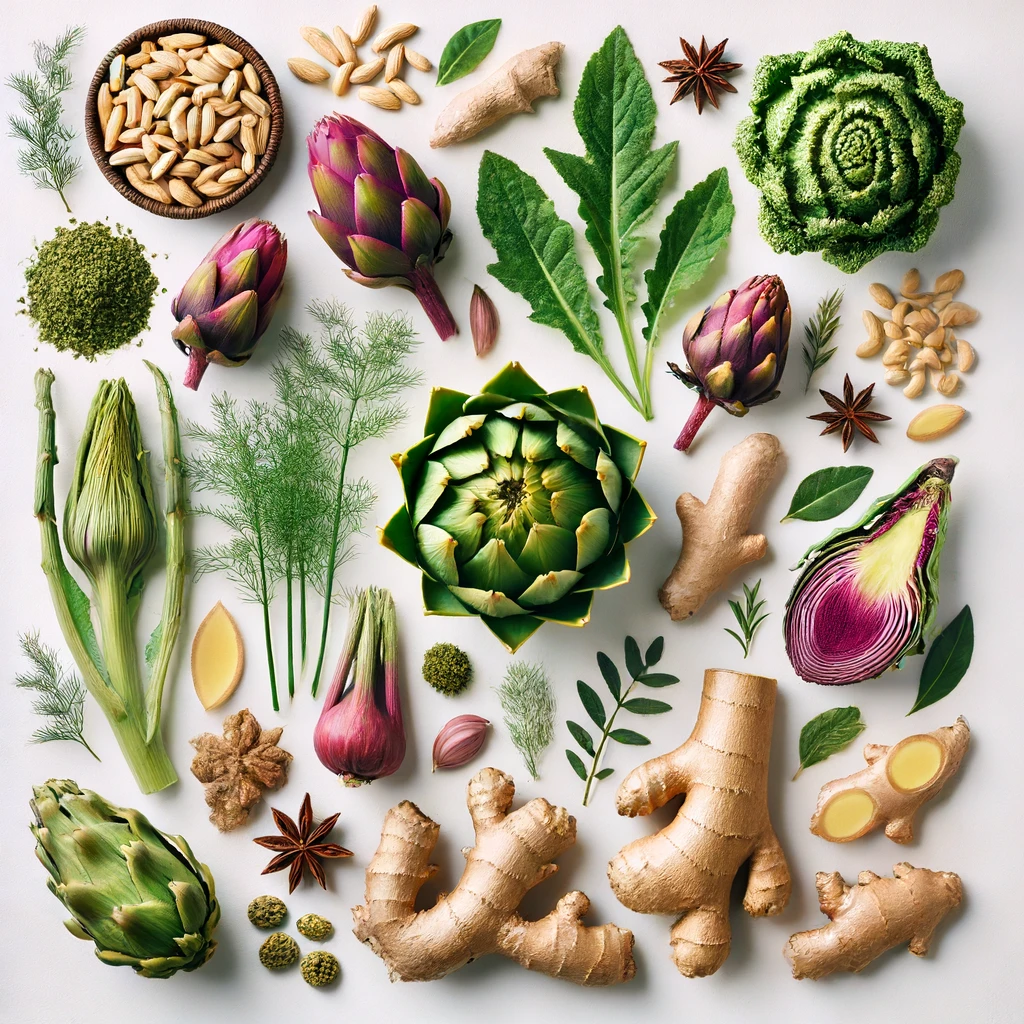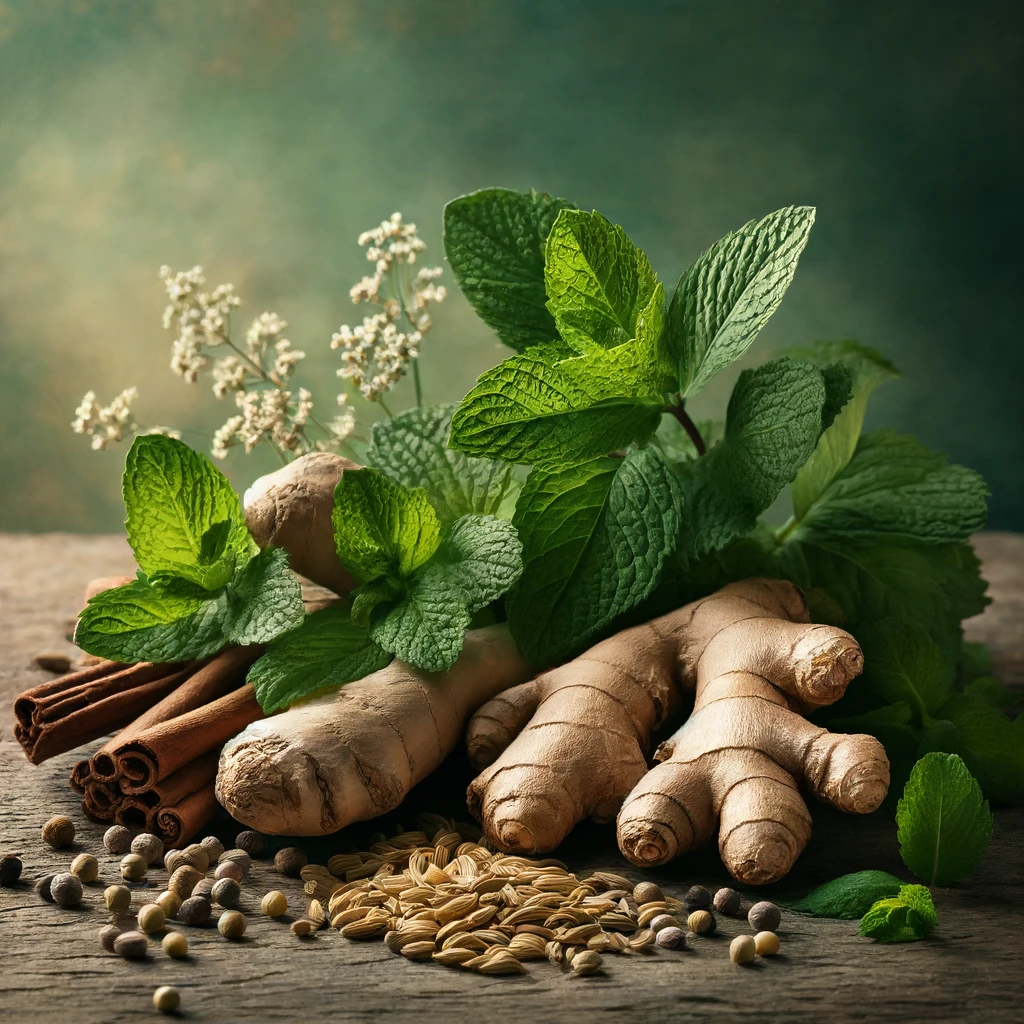As time goes by, people are increasingly interested in natural and holistic ways to support and improve their health, both in general and particularly for digestive health. Digestive bitters are a great aid in improving digestion and maintaining overall health and wellbeing.

Digestive bitters are plant extracts made from bitter-tasting plants. They have been traditionally used in various cultures for centuries and thousands of years as herbal remedies known to stimulate digestion and support the body's natural processes. By harnessing the power of bitter plants, digestive bitters activate the digestive system and promote the production of digestive enzymes and bile, which are essential for breaking down food and effectively absorbing nutrients.
As people become more aware of the additives in food and the unhealthiness of processed foods and synthetic medications, the natural, often forgotten solutions found in nature are becoming more attractive—solutions that have been known since ancient times. Bitter plants have always supported people throughout history. People are rediscovering these ancient remedies and weaving them back into their daily lives to balance digestion and prevent digestive problems such as bloating, indigestion, and uncontrollable sugar cravings.
Digestive bitters are extracts from bitter plants with a digestive-supporting and stimulating effect. These extracts are typically used in liquid form and have a very strong bitter taste. The primary mechanism through which bitters work is by stimulating the digestive system, encouraging the body to more effectively produce stomach acid, digestive enzymes, and bile—all of which are crucial for optimal digestion, food breakdown, and nutrient absorption.
Digestive bitters primarily work by stimulating communication between our taste receptors and the digestive system. When we consume bitter-tasting plants, they activate the bitter receptors on the tongue. This activation sends a signal to the brain, which then commands the digestive system to get to work. The signal travels to the digestive system via the vagus nerve, triggering a cascade of reactions aimed at efficiently digesting food.
One of the key mechanisms of action of digestive bitters is the activation of digestive juices—stomach acid, bile, and digestive enzymes. These are essential for breaking down food and absorbing nutrients. Bitters activate these processes in the following ways:
Digestive bitters not only stimulate the production of digestive juices but also have a positive impact on intestinal motility and digestion overall.
Intestinal Motility: Digestive bitters help regulate the speed at which food moves through the digestive tract, promoting smooth digestion and reducing the risk of constipation. At the same time, they regulate diarrhea by stimulating the production of digestive enzymes and bile.
Appetite Regulation: Bitter plants help regulate ghrelin, the hunger hormone. Short-term, they may stimulate appetite, but in the long run, they help reduce overall hunger. This can help prevent overeating and restore a balanced sense of hunger. Additionally, digestive bitters help the body absorb more nutrients from food, which reduces the need for excessive eating.
Reducing Digestive Discomfort: By stimulating digestion, digestive bitters help reduce unpleasant symptoms like bloating, gas, stomach pain, constipation, diarrhea, and heartburn. Improved digestive juice production and faster intestinal movement improve overall digestion.
The Gut-Brain Connection: There’s growing talk about the connection between the brain and the gut. Better balance on the gut-brain axis means better overall health and wellbeing. By supporting effective digestion and reducing digestive disruptions, digestive bitters indirectly promote emotional wellbeing.
In summary, digestive bitters stimulate a series of processes through the activation of taste receptors, which enhance digestion.
Digestive bitters help kickstart digestion and ensure that we absorb all the nutrients from our food.

Digestive bitters can relieve many digestive complaints.
Digestive bitters have a unique ability to regulate appetite—whether it's reducing sugar cravings or boosting healthy appetite when it's lacking.

Besides directly stimulating digestion, digestive bitters can also enhance overall digestive system health.
Improved microbiome:
Digestive bitters can positively impact the gut microbiome—the community of bacteria living in our intestines. By creating a better environment through more effective digestion, bitters help beneficial bacteria flourish while suppressing harmful ones.
Reduced gut inflammation:
Certain bitter plants possess anti-inflammatory properties that soothe the gut lining. This can be especially helpful for chronic conditions such as irritable bowel syndrome (IBS).
Digestive bitters support the body’s natural detoxification processes, particularly by stimulating liver function.
The use of bitter plants is ancient and spans cultures around the world. In traditional Chinese medicine, bitters were used to balance the body's energy system and aid digestion. Similarly, bitters have been used in Ayurveda in India, where they were used for regulating appetite, cleansing the liver, and supporting digestion.

In Europe, the use of bitter plants also has a long history—they were consumed as aperitifs before meals or digestives after meals to aid digestion. One of the most well-known examples is Swedish bitters—a popular tonic believed to have numerous health-supporting effects. Another well-known example is Angostura bitters, originally produced as a remedy for digestive problems but later adapted for cocktail making. Today, Angostura produces a wide variety of bitters, primarily for use as ingredients in alcoholic cocktails.

Native American cultures have used bitter plants for medicinal purposes. For example, Native American tribes used dandelion root and burdock root for digestive issues and general health support.
Throughout history and across cultures, bitter plants have been valued primarily for their ability to improve digestive function and alleviate digestive disorders. Today, we are rediscovering bitters as a valuable natural remedy for digestion.
Digestive bitters typically contain several plant ingredients, each supporting the digestive system in its own way and synergistically. Some common ingredients in digestive bitters include:

These digestive bitters contain a carefully selected combination of plants that gently yet effectively support digestion.


Dosage: Take one pipette (6–7 drops) before meals. You can increase the amount if you experience digestive discomfort.
Timing: Digestive bitters should be taken about 5–10 minutes before eating to prepare and activate digestion. Hold the bitters in your mouth to experience the taste for as long as possible.
If you've eaten a heavy meal and forgot to take the bitters beforehand, they can still activate digestion afterward—just take them whenever you remember.

Digestive bitters have numerous beneficial properties that support gut health and overall well-being. They stimulate the production of digestive enzymes and bile, aiding the breakdown and absorption of nutrients. By improving intestinal motility, bitters help prevent constipation and promote smooth digestion. They also help regulate appetite—increasing it for those with low appetite or enhancing feelings of fullness and reducing sugar cravings to prevent overeating. Additionally, digestive bitters support gut health by positively influencing the microbiome and reducing inflammation. Their role in enhancing liver function and detoxification offers valuable benefits in today's toxic environment.

Adding digestive bitters to your daily routine is a simple yet highly effective way to support your digestive system. They’re part of a holistic approach to maintaining digestive health—alongside balanced nutrition, regular physical activity, and stress management.
Humans have lived in harmony with bitter flavors for a long time. It’s only in recent decades that we’ve largely bred them out of our food, but our bodies still remember and crave that balance. Bitterness is much more than just a taste—it has powerful, positive effects on the body. It's a natural ally for our digestive system, which is why bitters can be used long-term as part of good digestive hygiene.

MERJE PEEKMA
After four pregnancies, my digestion had been out of balance constantly. But after using digestive bitters for a month, I’ve honestly had no more issues. I take them every day.
IREEN LAHT
Since I started taking a few drops of the digestive bitters before dinner, I haven’t had any more gallbladder attacks. And that’s how it’s been. So, it’s definitely good and useful stuff. 🙂 Before, I used to have pain once or twice a month if I slipped up. I had to be really careful about what, when, and how much I ate.


INDREK ANDEMA
A really good and nice helper. I used to struggle with heartburn and reflux, but since using the digestive bitters, I haven’t had any problems in the last six months. I can also handle spicier foods now. The apple cider vinegar version is my favorite, but the one with alcohol also has a nice taste. The new bottle has a really beautiful design too 😉
IVI KURG
I have to admit, sometimes I forget and miss a dose. But I’ve noticed that my sugar cravings have really decreased, and I don’t get random hunger pangs anymore. Those are the main things that come to mind right away.
